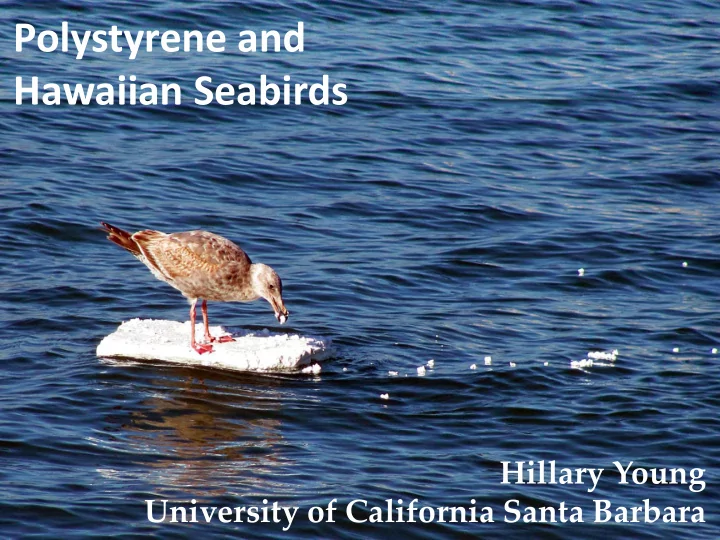

Polystyrene and Hawaiian Seabirds Hillary Young University of California Santa Barbara
Hawaiian islands are a seabird hotspot Largest Tropical Seabird Rookery on the Planet
Globally, seabirds have declined by 70% since 1950
Globally, seabirds have declined by 70% since 1950
Largest declines in long-ranging species including many Hawaiian species such as albatross
Tropical seabirds face particular foraging challenges
Polystyrene compounds these challenges.
Frans Lanting, National Geographic Vericool Packaging
Polystyrene resistant to biodegredation • Easily persists 500 years in environment
Thus we expect that by 2050 polytsyrene and other plastics will be found in 99% of seabirds Wilcox et al., 2015
Polystyrene quickly breaks down to small pieces
Polystyrene quickly breaks down to small pieces Lee et al., 2013
These pieces accumulate in the smallest prey species Marine Copepods Flourescently labeled polystyrene microfragments Lee et al., 2013
Polystyrene fragments then accumulate toxins (e.g. Hg & PCBs) Graca et al., 2014
Toxins bioccumulate
This can cause secondary poisoning in marine animals, including seabirds Jaymi Heimboch J.L. Lavers et al., 2014
This can cause secondary poisoning in marine animals, including seabirds • Mortality • Reduced Body Size • Infertility • Disrupted Neurological Function • Altered Sex Ratios Jaymi Heimboch J.L. Lavers et al., 2014
Polystyrene also causes mechanical blockages, false feelings of ‘fullness’, and interrupted breathing
98% of dead albatross chicks are found to have plastics in their stomachs
Polystyrene seabird declines Ingested plastic J.L. Lavers et al., 2014
Wide range of wildlife exposed More than 180 marine species documented eating plastics, including many of Hawaii’s most iconic species
Cultural as well as conservation significance Seabirds have important roles in Hawaiian culture including traditional wayfinding roles for voyagers
Recommend
More recommend